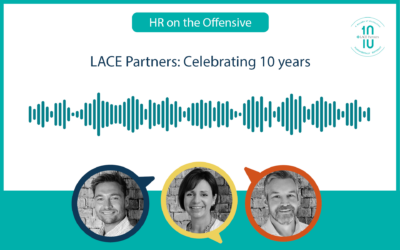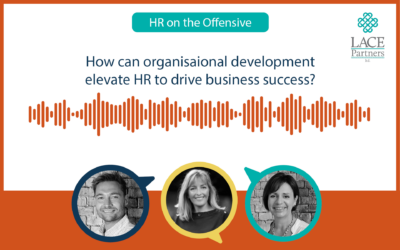In October we ran our annual people_tech event which provided senior HR professionals with insight into the latest HR technology advancements. It also featured discussion groups on two topics: line manager capability and HR capability. The feedback – as well as some results from interactive real-time voting – provided some fantastic insights. As a result, we asked Co-Founder Cathy Acratopulo to elaborate on some of the findings in this two-part blog. Part one is available below.
As an HR Transformation consultancy, we help our clients to define and achieve their target operational model for HR and to implement HR systems successfully. Throughout our engagements, we always highlight HR’s critical dependency on line managers to ‘own’ their people management responsibilities. Without this, the benefits from the change can be impacted significantly, resulting in a lower than expected return on investment.
When defining HR processes end-to-end end, for example as part of moving to HR shared services or implementing a new core HR system, it is important to define what a line manager will be accountable for, as well as HR and the employee. Depending on the existing environment, the assumptions made about who does what will have a varying degree of impact on the line manager population.
Line managers are often the toughest audience group to engage during an HR transformation programme: it may be the first time they have been explicitly asked to own particular people management processes and/or they may feel that they are being asked to do tasks they see as ‘HR’s job’. As such, it is important to understand how the proposed change impacts them and how they can be best supported during and beyond the transformation.
How would you rate your people managers?
As part of the research for our white paper ‘HR on the Offensive’, we found that 64% of the participants stated that the people management capability of their line managers was ‘average’, with a total of 87% stating the capability was average, low or very low (across 22 different organisations). During our recent people_tech event, we asked our guests the same question and found very similar results. 49% felt that the people management capability of their line managers was ‘average’, with a total of 88% rating capability as average, low or very low (49 respondents).
So, whilst this is a broad-brush question, we know there is an issue. And we also know that, unless HR can improve the capability of line managers, they will be ‘pulled into the weeds’ to support individuals with managing their teams, leaving less time to focus on those activities that can deliver more value for the organisation.
What does ‘good’ look like?
We often find that organisations have not explicitly set out what ‘good’ people management looks like and what is expected from anyone who manages others. When we asked our people_tech guests, over half said they hadn’t defined it. Some of the 47% who responded ‘Yes’ explained that they had organisational competency frameworks in place that included people management.
In our experience, it is rare to find an organisational definition of people management capability that clearly sets out the ‘what’ and the ‘how’ i.e. what a people manager is required to do (e.g. how often they are expected to have performance conversations with their team) and how it should be done (e.g. the way in which the performance conversation should be conducted in terms of behaviours). Given that people management is a relatively generic skill set, it shouldn’t be that difficult to define what good looks like. I am sure we can all think of times when we have been on the receiving end of both excellent and poor people management. But it would seem that many organisations haven’t defined it explicitly, perhaps assuming that most line managers understand what’s required of them. However, without a clear understanding of what’s expected, it isn’t too surprising that people managers may come up short.
What support is provided to improve people management capability?
If we agree that line managers could be better at managing people and it would be helpful to define what good looks like, the natural next step would be to provide development support so they can improve.
When we asked our people_tech attendees if they trained line managers on people management skills, the majority (75%) stated that they did.
Given the relatively low rating of existing people manager capability provided by the same group, this result does raise the question about the effectiveness of the development support provided. However, a number of attendees explained that their people management training was a relatively recent intervention. Others said the training they provided was only available to a portion of the workforce e.g. senior managers as part of a broader development offering, or team leads taking on their first people management positions. In general, it was accepted that people management training is required at every level of the organisation, to give line managers the confidence and capability to manage their teams effectively. Whilst interventions at the front line (e.g. team leaders) may deliver some immediate value, unless these individuals are themselves being managed effectively by their line managers, the impact may be short-lived.
When we work with clients to transform their HR function, we often find that they have set aside some budget to communicate and train employees and line managers on what’s changing for them in terms of processes and systems. But this doesn’t usually cover the investment required to address any gap in people management capability. Providing some development support to help them to be better people managers, at the same time as raising their understanding of how the change can make their lives easier, can help to gain their buy in and acceptance. This in turn can achieve better long-term adoption of the new ways of working.
On Monday in part two of this blog we’ll explore how much delegates felt people management was valued in their business, as well as how HR’s role is in improving line manager capability.
If you would like to talk to any member of the LACE Team about people_tech or how LACE Partners could help you with your own HR transformation, then get in touch today on +44 (0) 20 8065 0310 or email info@lacepartners.co.uk. If you’d like to connect with Cathy you can do so on LinkedIn here.






